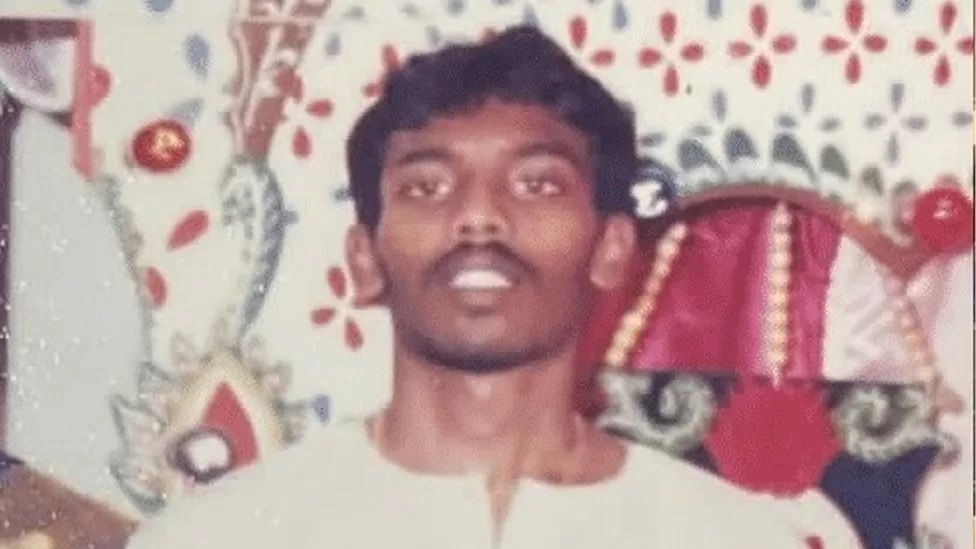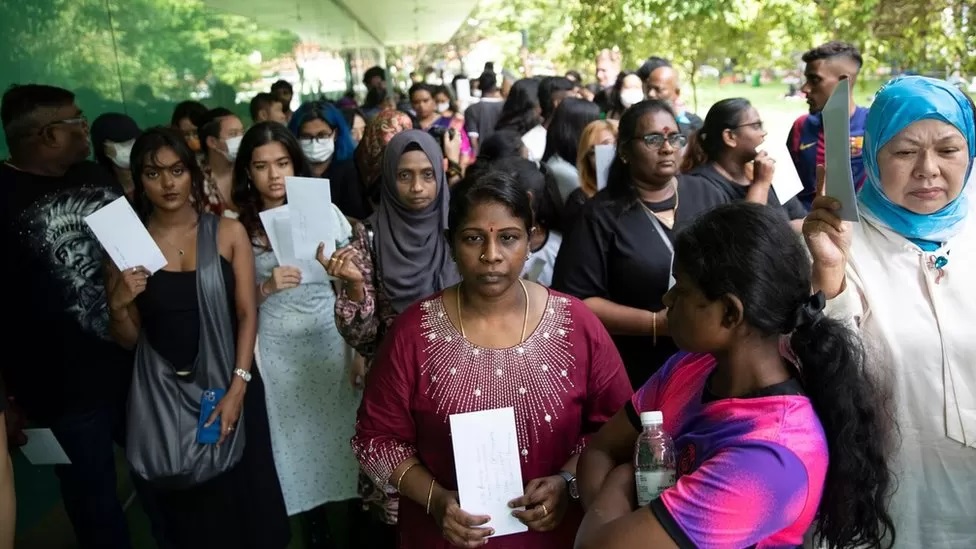Singapore is set to hang a man for trafficking cannabis, in the city-state’s latest controversial execution.
Activists say Tangaraju Suppiah was convicted on weak evidence. Authorities say he received due process, and have scheduled his execution for Wednesday.
It follows a high-profile execution last year of an intellectually impaired man over a drug charge.
Singapore has some of the world’s toughest anti-drug laws, which it says are necessary to protect society.
In recent days his family members and activists delivered letters to Singapore’s president Halimah Yacob in a last-minute plea for clemency, while British billionaire Sir Richard Branson has called for a halt of the execution and a review of the case.

“I know that my brother has not done anything wrong. I urge the court to look at his case from the beginning,” Tangaraju’s sister, Leela Suppiah, told reporters at a news conference.
Tangaraju, 46, was convicted of “abetting by engaging in a conspiracy to traffic” over a delivery of 1kg (35oz) of cannabis from Malaysia to Singapore in 2013.
Though he was not caught during the delivery, prosecutors said he was responsible for coordinating it, and traced two phone numbers used by a deliveryman back to Tangaraju.
Tangaraju claimed he was not the person communicating with others connected to the case. He said he had lost one of the phones and denied owning the second one.
Singapore law mandates the death penalty for drug trafficking and has lesser penalties for couriers. In Tangaraju’s last appeal, the judge agreed with the prosecution that Tangaraju was responsible for coordinating the delivery, which made him ineligible for a more lenient sentence.
Activists have also raised concerns that Tangaraju was not given adequate access to an interpreter and had to argue his last appeal on his own since his family was unable to secure a lawyer.
Singapore authorities say Tangaraju requested for an interpreter only during the trial, and not earlier. They added that he had access to legal counsel throughout the process.

Sir Richard, who previously criticised the 2022 execution of mentally disabled Nagaenthran Dharmalingam, said Tangaraju’s case was “shocking on multiple levels”.
In a blog post, he said Singapore “may be about to kill an innocent man” on the back of “more than dubious circumstances”.
“The death penalty is already a dark stain on the country’s reputation. An execution following such an unsafe conviction would only make things worse,” he said.
Rebutting his allegations, Singapore’s Home Affairs Ministry said his claims were untrue and accused him of “disrespect for Singapore’s judges and our criminal justice system”.
It said the death penalty was “an essential component” in a multi-pronged approach that has been “effective in keeping Singapore safe and secure”.
Kirsten Han, a spokesperson for Singaporean anti-death penalty advocacy group the Transformative Justice Collective (TJC), said the government did not want to appear to buckle under pressure.
But, she added, “Of all the things that Singapore punches above its weight for on the international stage and at the UN, defending its right to murder people in the name of its citizens is not something we should be proud of for being outstanding on the international stage”.
Singapore’s strict rules stand in contrast to some of its neighbours’ recent moves. Thailand has legalised the trade of cannabis while Malaysia has ended the mandatory death penalty for serious crimes.
Speaking to reporters on Sunday, Tangaraju’s family members said they were able to meet him from behind a glass partition at Changi Prison after his notice of execution was released last week.
“He puts up a brave front for my mother because he does not want her to break down,” his niece Subhashini Ilango said. “He has mentally prepared for this day to come. He does feel there’s a great injustice and he’ll be executed for something he did not do.”
His family said they would continue to press for reforms in Singapore’s legal system even if Tangaraju ends up executed.
“If such an injustice happens to my brother, I wouldn’t want it to happen to anybody else so I will continue to fight,” said his sister Leela.
Singapore is set to hang a man for trafficking cannabis, in the city-state’s latest controversial execution.
Activists say Tangaraju Suppiah was convicted on weak evidence. Authorities say he received due process, and have scheduled his execution for Wednesday.
It follows a high-profile execution last year of an intellectually impaired man over a drugs charge.
Singapore has some of the world’s toughest anti-drug laws, which it says are necessary to protect society.
In recent days his family members and activists delivered letters to Singapore’s president Halimah Yacob in a last-minute plea for clemency, while British billionaire Sir Richard Branson has called for a halt of the execution and a review of the case.

“I know that my brother has not done anything wrong. I urge the court to look at his case from the beginning,” Tangaraju’s sister, Leela Suppiah, told reporters at a news conference.
Tangaraju, 46, was convicted of “abetting by engaging in a conspiracy to traffic” over a delivery of 1kg (35oz) of cannabis from Malaysia to Singapore in 2013.
Though he was not caught during the delivery, prosecutors said he was responsible for coordinating it, and traced two phone numbers used by a deliveryman back to Tangaraju.
Tangaraju claimed he was not the person communicating with others connected to the case. He said he had lost one of the phones and denied owning the second one.
Singapore law mandates the death penalty for drug trafficking and has lesser penalties for couriers. In Tangaraju’s last appeal, the judge agreed with the prosecution that Tangaraju was responsible for coordinating the delivery, which made him ineligible for a more lenient sentence.
Activists have also raised concerns that Tangaraju was not given adequate access to an interpreter and had to argue his last appeal on his own since his family was unable to secure a lawyer.
Singapore authorities say Tangaraju requested for an interpreter only during the trial, and not earlier. They added that he had access to legal counsel throughout the process.

Sir Richard, who previously criticised the 2022 execution of mentally disabled Nagaenthran Dharmalingam, said Tangaraju’s case was “shocking on multiple levels”.
In a blog post, he said Singapore “may be about to kill an innocent man” on the back of “more than dubious circumstances”.
“The death penalty is already a dark stain on the country’s reputation. An execution following such an unsafe conviction would only make things worse,” he said.
Rebutting his allegations, Singapore’s Home Affairs Ministry said his claims were untrue and accused him of “disrespect for Singapore’s judges and our criminal justice system”.
It said the death penalty was “an essential component” in a multi-pronged approach that has been “effective in keeping Singapore safe and secure”.
Kirsten Han, a spokesperson for Singaporean anti-death penalty advocacy group the Transformative Justice Collective (TJC), said the government did not want to appear to buckle under pressure.
But, she added, “Of all the things that Singapore punches above its weight for on the international stage and at the UN, defending its right to murder people in the name of its citizens is not something we should be proud of for being outstanding on the international stage”.
Singapore’s strict rules stand in contrast to some of its neighbours’ recent moves. Thailand has legalised the trade of cannabis while Malaysia has ended the mandatory death penalty for serious crimes.
Speaking to reporters on Sunday, Tangaraju’s family members said they were able to meet him from behind a glass partition at Changi Prison after his notice of execution was released last week.
“He puts up a brave front for my mother because he does not want her to break down,” his niece Subhashini Ilango said. “He has mentally prepared for this day to come. He does feel there’s a great injustice and he’ll be executed for something he did not do.”
His family said they would continue to press for reforms in Singapore’s legal system even if Tangaraju ends up executed.
“If such an injustice happens to my brother, I wouldn’t want it to happen to anybody else so I will continue to fight,” said his sister Leela.
